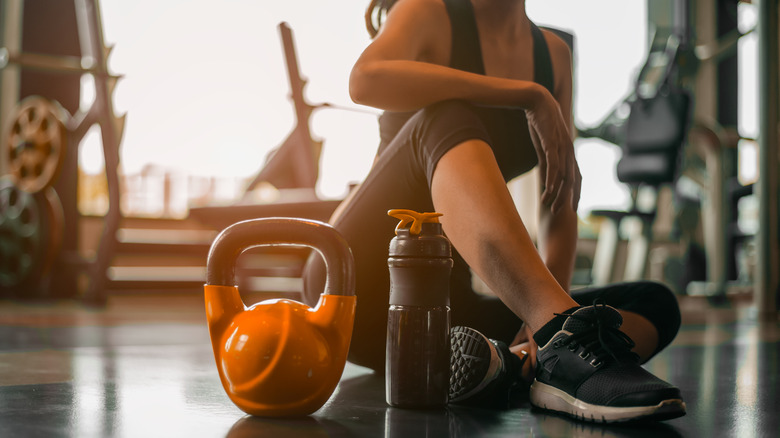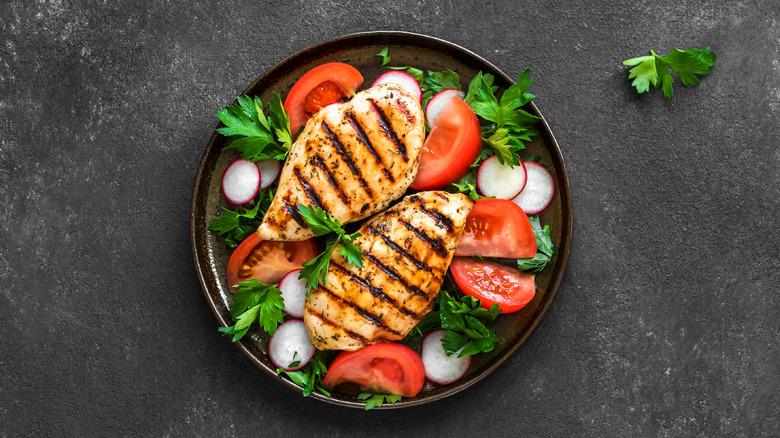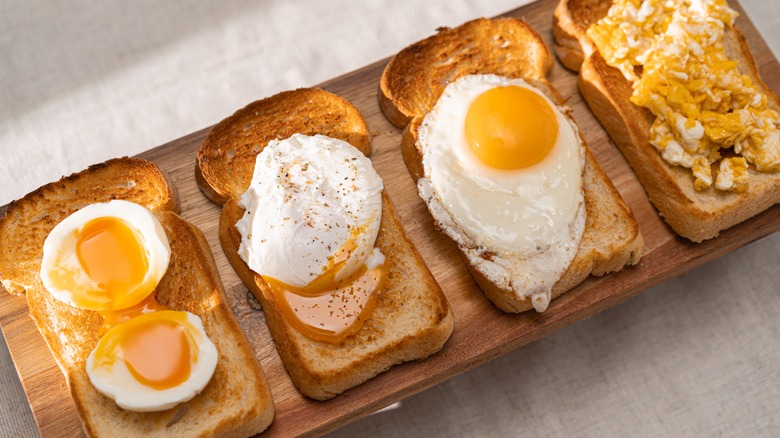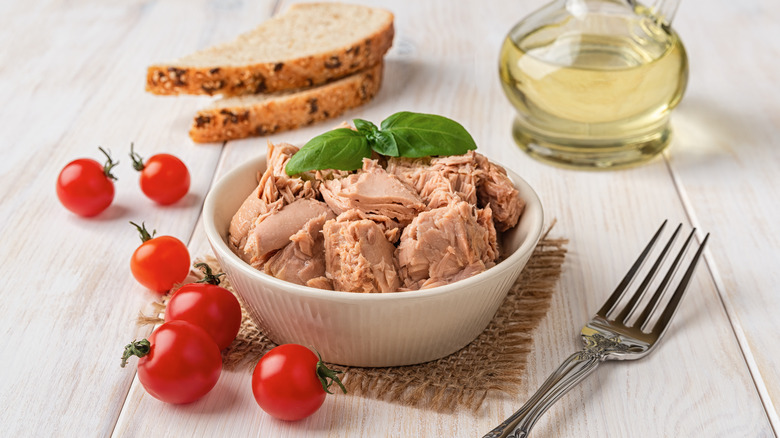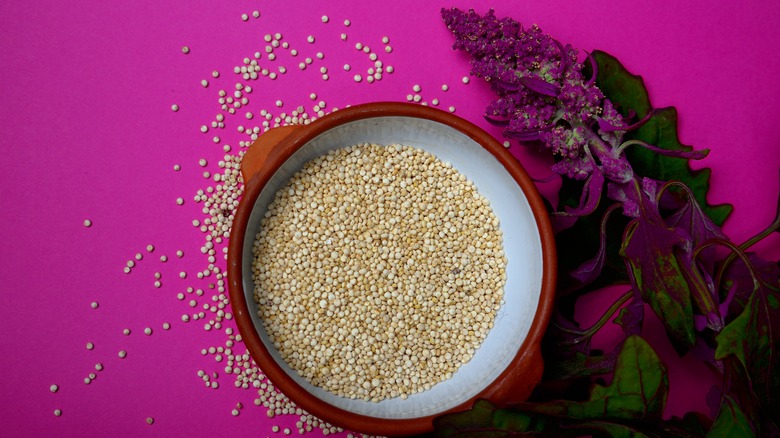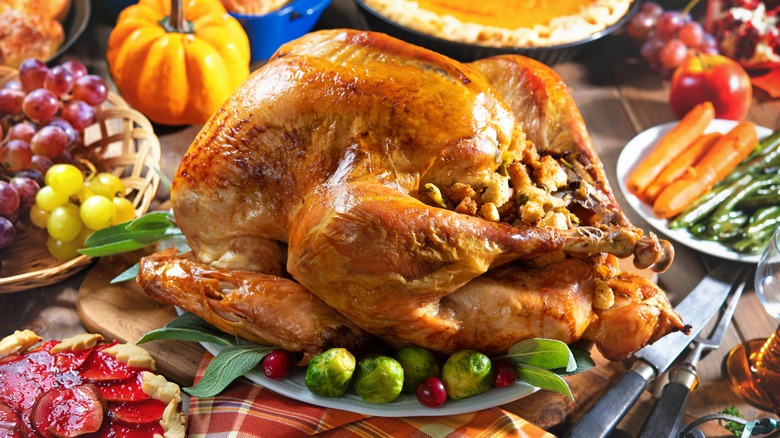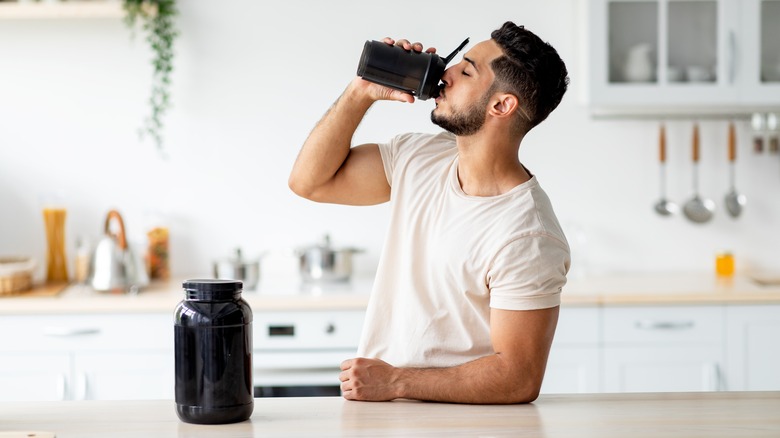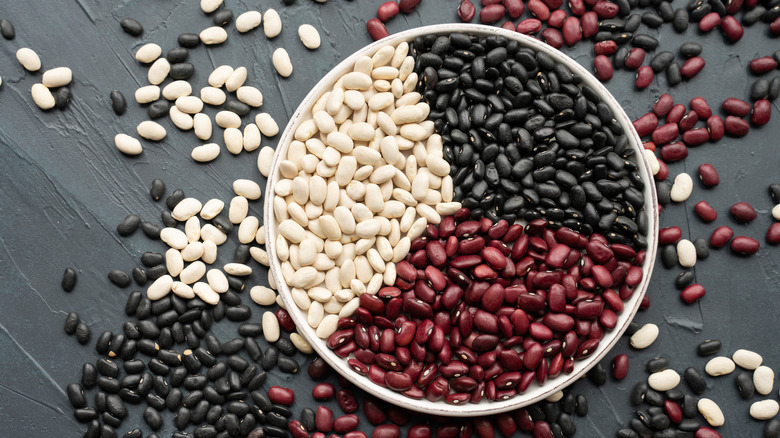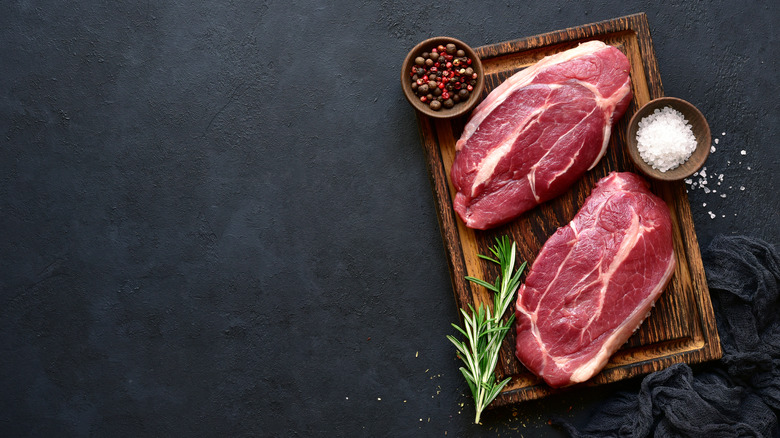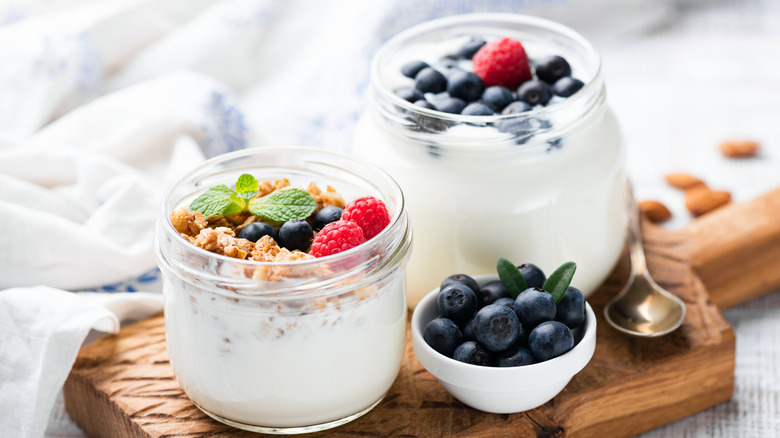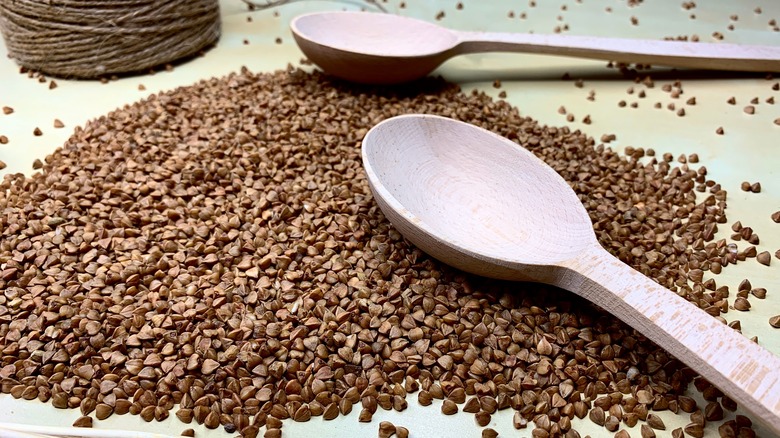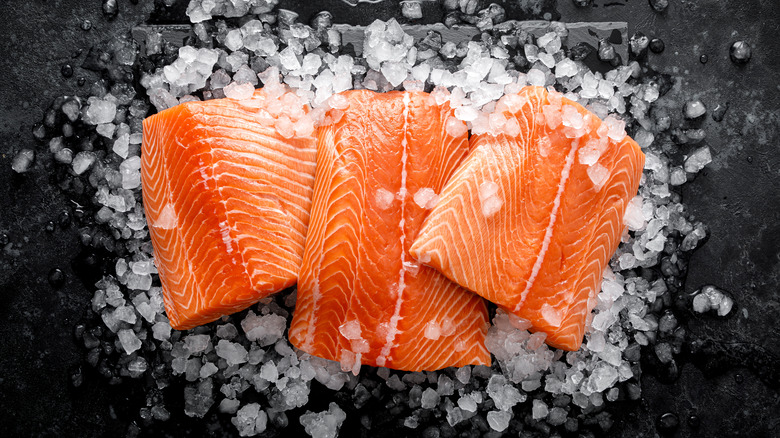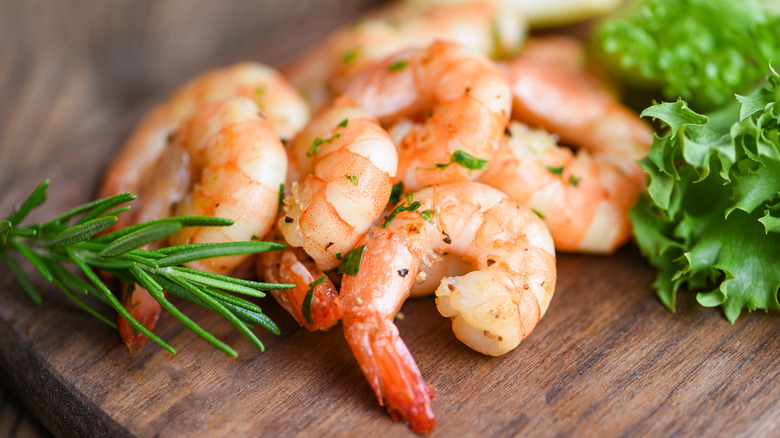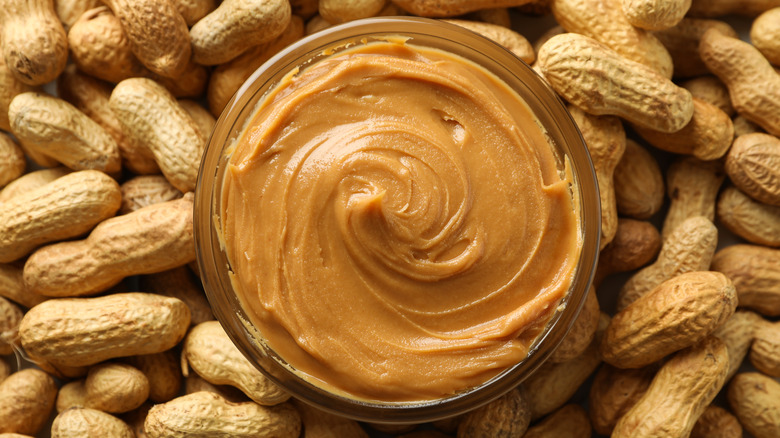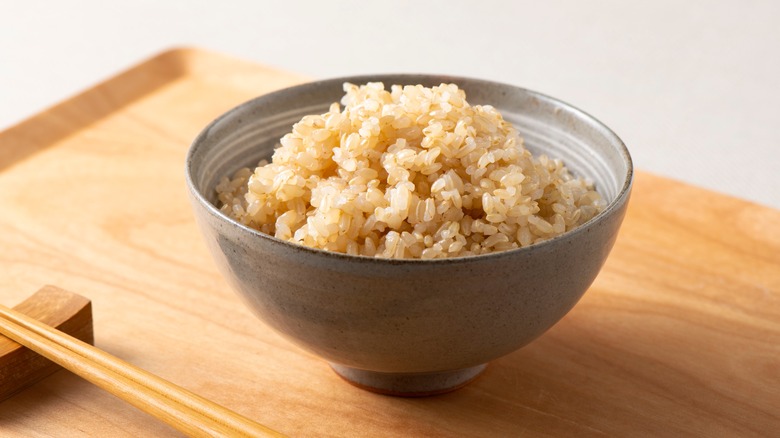14 Foods You Should Start Eating If You Want To Build Muscle
There is more to building muscle that eating #brotein, but protein consumption can play a huge role in your body's ability to pack on lean muscle (via Healthline). Many of us hit the gym regularly in pursuit of the goals of our choosing. Whether your goals are strength focused, physique focused, or purely about enjoying an hour of "me time," your gains will best be reaped if your diet supports the work you're putting in. But just eating a diet of vegetables and fruits is not going to cut it; this rigid approach is more likely to hinder your progress than anything else.
Simply explained, pumping iron is a way of placing stress on your muscle fibers (via Healthline). As you tax these muscle fibers, they have no choice but to adapt and rebuild themselves a bit stronger. This is called muscular hypertrophy. Hypertrophy is best accomplish by lifting weights, but you cannot just deplete your body and then neglect to give it the building blocks it needs. Enter, protein — it helps repair your worked muscles on a cellular level and aids in the growth of new muscle fiber cells.
A sedentary adult can get by with 0.8 grams of protein per kilogram of body fat per day (per Verywell Fit). Athletes are instructed to eat 1.2 grams — 2.0 grams of protein per kilogram of body weight per day. If you want to start building muscle, eating these 14 foods might just help you develop the strength and stature you've been coveting.
Chicken breast
We know, we know. That guy you dated from the gym was obsessed with eating plain chicken breast for dinner every day, and while his diet and his personality were incredibly dull, his abdomen was anything but. Turns out, Mr. Weights-for-Brains and his swollmates were onto something — not that you need to eat dry chicken breast every night, but chicken breasts are a great way to up your lean protein intake.
A 3-ounce serving of chicken breast contains around 24 grams of protein, but only 120-ish calories (via Healthline). This same serving contains a scarce 3 grams of fat and virtually no carbohydrates, though if you embellish your chicken to make it more palatable, these macronutrient figures are subject to change, of course. And the vitamin profile of chicken is surprisingly healthy as well — from selenium to copper to abundant B vitamins, chicken breasts are stacked with nutritious goodies.
Eggs
While some people simply cannot stomach eggs, those of us who can know one thing to be true: Life without eggs doesn't make any sense. I mean, what would one eat for breakfast if not for eggs? It is worth noting that this versatile fridge staple is one of the most nutritionally dense food sources out there (via WebMD). To clear one thing up, yes, egg yolks do contain quite a bit of cholesterol. However, relevant research continues to prove that saturated fats affect our blood cholesterol far more negatively than the cholesterol consumed via our daily sunny-side-up habit.
Eating such a nutrient-rich breakfast can help you feel fuller for longer, which is helpful when it comes to weight loss if that is something you are after. A single egg contains about 75 calories, around 7 grams of protein, and about 5 grams of fat. All of the fat is located within the yolk, but not all of the protein is housed within the white. While it might seem tempting to ditch the yolks to cut down on your fat intake, egg yolks contain powerful compounds that are thought to fight many age-related illnesses (via Healthline).
Tuna
Tuna is another great option when it comes to muscle-building nutrition (via Verywell Fit). While eating plain dry tuna sounds about as awesome as chomping on raw chili powder, there are more options out there than just tuna out of a packet (we are looking at you, sushi, we are looking at you), and also many ways to make a nutritious and tasty meal out of the canned version (via Women's Health).
A standard can of tuna that is packed in water is 165 grams, which is the equivalent of around 5.8 ounces. This serving size packs in an insane amount of protein — 42 grams! Since the fish is packed in water and not in oil, it contains no carbohydrates and very little fat, around 1.5 grams. Though the fat content of your tuna can change depending on the type, tuna contains much of its fat in the form of omega-3 fatty acids. This is the kind of fat that you want to eat, as it has been linked with dramatically lowering your risk of developing heart disease (per Verywell Fit).
Quinoa
If you are looking for a less meaty way to get in foods that support your gym efforts, quinoa is a great place to start. Quinoa is known to be a "superfood" and seemingly came out of nowhere with a huge glow-up around the time juice bars started popping up on every corner (via Everyday Health). Quinoa has been well known for thousands of years, though, with the ancient Inca people even dubbing it "the mother grain."
So, it is super old and super popular, much like Jane Fonda (seriously, her staying power is next level), but how does quinoa support muscle building? Well, it is naturally lower in carbs than the ever-popular rice because it is a seed, not a grain. It is structurally dissimilar to many of the grains we typically eat, even though we prepare and consume it as if it were a grain.
While the protein-packing prowess of quinoa is no match for epically stacked foods like chicken and tuna, it contains enough to make it a notable food for muscle mass-building. A one-cup serving of our favorite pseudo-grain contains around 39 grams of carbohydrates, which can also help support you in your athletic endeavors, 8 grams of protein, 6 grams of fat, and 5 grams of fiber.
Turkey
Sure, turkey is similar to chicken in some ways, but not in every way, which is why we felt it important to include turkey as a separate muscle-building food. Besides, turkey usually only gets love at Thanksgiving; it's time to give this nutritious and adorable barnyard fowl an off-season moment to shine (via Healthline). A 3-ounce serving of turkey contains around 24 grams of protein, 2 grams of fat, and no carbohydrates. Much like chicken, the cut of the meat plays a major role in the macronutrient breakdown of your meal. In general, the darker meat of the turkey's legs and thighs has more fat and less protein, while the white meat of the breasts is leaner. Moreover, turkey skin has a significant amount of fat in it, so if you are watching your fat intake as you bulk up, that is something to keep in mind. Beyond just the killer protein profile, turkey offers a ton of vitamins and minerals that can improve the function of many of your biological systems.
Protein powder
Yes — we did say that there is more making muscular gains than just brotein, but there is a time and a place for those funny protein shakers used by every dude at the gym. And that time and place is when you're trying to up your protein intake to increase your muscle mass (via Healthline). Protein powders can be made of a variety of different substances such as eggs, casein (the protein found in milk), peas, hemp, brown rice, and a variety of other plants, so it is up to you to decide what kind will best suit your needs.
Protein powders are a quick and convenient way to shove more lean protein into your system. If you are trying to pack on muscle but struggling to hit your protein goals for the day, investing in a protein powder might be a good place to start. Not all protein powders are created equal, but with a bit of research, we expect that you'll be able to find one that gives you the nutrition you need without wreaking havoc on your gut.
Beans
Beans are really the best. They offer so much nutrition (per Healthline), and if it wasn't for their gaseous reputation, we bet more people would be nomming on beans all day (and, well, probably passing gas, because this rumor is rooted in fibrous truth). Beans, and pinto beans specifically, are incredibly nutrient-dense. They provide so many vitamins and minerals to help our insides live their best lives. They also have a significant amount of protein, especially considering that it is plant-based protein; plant-based sources of protein often lack the epic amounts of lean protein that animal products can pack in (via Healthline).
One cup of beans has around 15 grams of protein, but eat this cup of beans with caution as it also contains 15 grams of fiber. The same size serving also has about 45 grams of carbohydrates and 1 gram of fat. A cup of beans contains around 20% of the daily recommended value for iron, also, which is hugely beneficial, especially if you are leaning toward a more plant-based approach to muscle building.
Lean beef
You might not think of beef as a "health" food, and through some lenses it is not. But if you are looking to build muscle, the protein provided by lean beef is definitely worth your while. Red meat, and lean beef in particular, offers good health benefits because it has much higher iron and zinc contents than poultry and fish. However, Healthline is clear that beef should be consumed in moderation as a part of a healthy diet.
A 3.5-ounce serving of 90% lean ground beef contains around 26 grams of protein, 12 grams of fat, and no carbs. To further expand upon on how much protein is in lean beef, cooked beef is made up of over 25% protein. Animal protein contains a full lineup of the essential amino acids, which we need to consume. These protein "building blocks" further encourage the generation of lean muscle and can also aid in recovery from some injuries, according to Healthline.
Greek yogurt
It kind of seems like we all knew that Greek yogurt is superior to the other thinner stuff, but we are here to confirm this suspicion. Greek yogurt contains significantly more protein in addition to its creamier, delicious texture. A 7-ounce serving of a standard kind of Greek yogurt contains around 20 grams of protein, though this number is subject to change based upon the manufacturer (via Healthline).
Greek yogurt is available in non-fat, reduced-fat, and full-fat options, though naturally the full-fat choices will have a higher fat content. When compared to regular yogurt, Greek yogurt usually contains fewer carbs, and it can often be found with no added sugar — though this probably only entices you if you like the semi-sweet and super tangy flavor of plain yogurt. Yogurt is also thought to aid in bone health and gut health, by way of probiotics. There is also evidence to support the notion that regular Greek yogurt consumption can help support more complete muscle recovery in athletes.
Buckwheat
Much like quinoa, buckwheat is a seed that we have appropriated for use as a pseudo-grain. Also like quinoa, buckwheat offers significantly more health benefits than true grains (per WebMD). It is rich in fiber, which we love, and also packs a pretty good punch when it comes to vitamins and minerals.
Since eating adequate amounts of protein is crucial when it comes to eating to gain muscle mass, you know that buckwheat has some. However, it does have a lot less than other sources. A half-cup serving of roasted buckwheat provides around 3 grams of protein, 17 grams of carbs, 1 gram of fat, and 2 grams of fiber. While this may not seem like a lot, incorporating foods with some protein at every meal can add up throughout the day — you can throw some buckwheat into things like soups, salads, and even cookies or pancakes (via Bon Appetit).
Buckwheat is considered to be a health food because of its vitamin content. The antioxidants this seed contains has also been known to reduce oxidative stress within the body, which may help reduce your risk of developing some cancers.
Salmon
Salmon is another great food to munch on if you are trying to pack on some muscle. Salmon contains a plentiful amount of lean protein, those coveted and heart-healthy omega-3 fatty acids, and a ton of micronutrients that can aid in our overall health. Salmon is also one of the healthier fish options to consume if you are concerned about mercury contamination, as it tends to have fewer toxins than many other types of fish, as reported by Verywell Fit.
A 3-ounce serving of salmon has 17 grams of protein, around 5 grams of fat, and no carbohydrates. About 1.5 grams of the fat contained in one serving of salmon is from omega-3 fatty acids, which is nearly half of the recommended amount to consume per day (via Healthline). Though the variations are fairly minimal, wild-caught salmon tends to be a bit leaner, which allows it to have a bit more protein (via Verywell Fit). Conversely, farmed salmon often contains a bit more fat and slightly less protein.
Shrimp
Shrimp might not have crossed your mind as a food that would help your body repair your muscle fibers and help lead to growth. But these little sea creatures pack a pretty powerful punch when it comes to all things nutrition and protein (via Verywell Fit). Unlike some of the others foods we have listed, shrimp is comprised of almost all protein, making it stand out amid a sea of food items that also contain carbohydrates and fat, pun totally intended.
To be clear, fat and carbohydrates are necessary macronutrients, but when it comes to building muscle, protein reigns supreme (via Men's Health). A 3-ounce serving of boiled or steamed shrimp contains less than 100 calories and 20 grams of protein, according to Verywell Fit. This same size serving contains less than 1 gram of carbs and less than 1 gram of fat. The small amount of fat in shrimp is predominantly omega-3 fatty acids, with a bit of the also-healthy polyunsaturated variety in there as well.
Peanuts
You might be peripherally aware of the love-hate relationship that body builders have with peanut butter, and if you weren't already, now you are. After all, what is better than going to town on a spoonful of your favorite peanut butter? Nothing else really moves us in the same way. ...
But taking a moment to go back to basics, simply chowing down on some peanuts can actually give you a little boost if you are looking to bolster your muscle mass (via Healthline). While it seems pretty unlikely that you are going to get down with 3.5 ounces of peanuts — this is almost a quarter of a pound — here are the nutrients that amount of these little legumes contains: over 550 calories, 16 grams of carbs, nearly 50 grams of fat, and over 25 grams of protein. So, while there is plenty of protein in peanuts, replacing your quarter-pound lean beef burger with a quarter pound of peanuts will leave you consuming a lot of fat. While most of the fat in peanuts is of the heart-healthy variety, over-consuming it still won't do you any favors when it comes to putting on muscle mass.
Brown rice
Brown rice is often considered to be the healthy step-sister of white rice, a little less delicious but oh-so much more nutritious. It turns out that the nutrition that is packed into these unrefined grains is far superior to that provided by white rice and can be a great option if you are trying to build muscle (per Healthline). One cup of brown rice contains around 5 grams of protein, less than 2 grams of fat, and around 45 grams of carbs.
The vitamin profile of brown rice is where the huge health benefits lie. While all of the vitamins brown rice contains are important for our health and vitality, one vitamin is worth paying special attention to. Manganese is often forgotten about as a vitamin, but can lead to huge health gains. It is known to aid in bone development, muscle contraction metabolism, nerve functioning, and blood sugar regulation, all of which are important to consider as you find your way into your strongest self yet. A cup of brown rice contains almost 90% of the recommended daily amount of manganese, according to Healthline, while white only contains around 16% of the stuff (per Livestrong.com).

